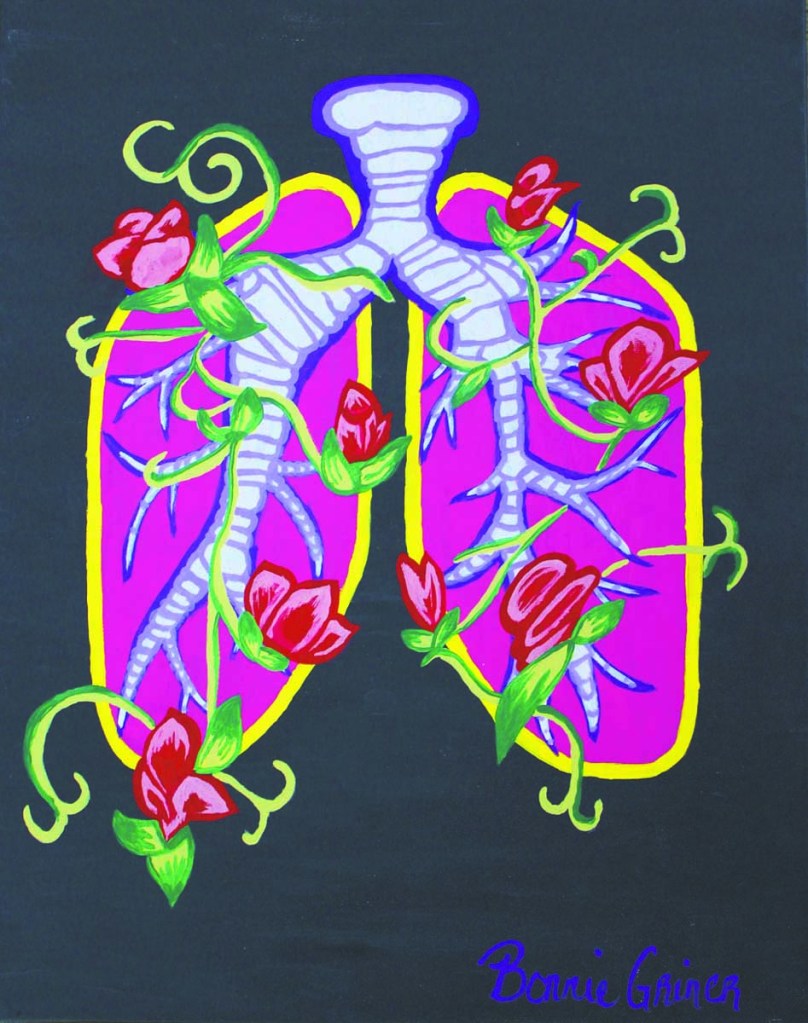Breathe for Bonnie: Griner hoping for lung transplant
Published 10:33 pm Tuesday, February 28, 2017

- Bonnie Griner painted this image when a friend asked her what she hoped her new lungs would be like. It’s become the logo of Breathe for Bonnie, the campaign to raise money to help Griner through her lung transplant.
MOULTRIE, Ga. — Bonnie Griner left town Sunday on a trip that she hopes will save her life.
Griner was diagnosed with cystic fibrosis when she was 5. She’s already passed two ages at which doctors had estimated her life expectancy — a salute to medical advances in the treatment of the genetic disease. The third prediction was 37 years — her current age — and if she’s going to pass this one, she’ll need help: a double lung transplant.
Trending
Cystic fibrosis is a disease that changes how your body makes mucus and sweat, according to the website WebMD.com. It affects how well your lungs, digestive system and some other body parts work. It’s caused by a flawed gene.
“If you have cystic fibrosis, you may have mucus that’s too thick or sweat that’s too salty,” WebMD said. “If heavy mucus clogs your lungs, it’s hard to breathe. It can also block your pancreas, an organ in your belly, so you can’t digest your food as well. The disease may make you sweat away too much of the salt your body needs to work well.”
The mucus in the lungs can trap bacteria, leading to infections, extensive lung damage and eventually, respiratory failure, according to the Cystic Fibrosis Foundation’s website.
When Griner was first diagnosed, her doctor said she wouldn’t live to graduate high school, but in fact she said she had no serious issue until she was 18, when she had to have her first “tune up,” a battery of intravenous antibiotics that CF patients often have to undergo. She’s had those tune-ups once a year since then.
But she still gets infections, and one infection two years ago set the stage for the life-or-death struggle she’s facing now.
The villain was a little thing called Mycobacterium abscessus, a bacterium distantly related to the one that causes tuberculosis. Griner’s lung function, which was already well below normal, dropped dramatically. She took intravenous antibiotics to kill the bacterium; they made her terribly sick, but her lung function improved. She finished the antibiotic regimen, and after a while her lung function deteriorated again.
Trending
“For the past two years we’ve been doing that on and off, and it hasn’t worked,” Griner said.
By “we,” Griner means herself and her “significant other,” Nick Chastain, the head of the special education department at C.A. Gray Junior High School.
“Nick and I met in college,” Griner said, “and we’ve been fighting this disease ever since.”
Chastain said they’d heard about “the window” for three or four years, but they’ve heard about it a lot since Griner got so sick. Transplant patients know all about “the window,” he said.
Doctors don’t want to do a transplant on someone who’s still pretty healthy, but if they wait too long, the patient’s body is too weak to handle the surgery. That zone between “too healthy” and “too sick” is the window, and because the infection knocked her down so fast, Griner nearly missed it.
She’d been going to Emory University monthly; the doctors there discovered the infection during one of those visits. When she applied for a lung transplant through Emory, though, she was denied.
She applied to the University of Alabama at Birmingham. UAB gave her a “maybe.”
She applied at Duke University, which gave approval for her to enter their transplant program.
Sunday, Griner headed to Duke for additional testing. If that turns out well, she’ll have to move near the Duke campus in Durham, N.C., where Duke medical personnel will put her through pulmonary rehabilitation — 23 rounds of lung exercises for at least four hours a day — to strengthen her body as much as possible for the surgery.
“If I felt good enough to exercise, I wouldn’t need a transplant in the first place,” she said. She’s been working out on an indoor trampoline as best she can to get ready for the rehab.
Once she moves to North Carolina, Griner will be on the waiting list for a double lung transplant.
She said one reason she had more success at Duke than other facilities was because people in North Carolina more frequently donate organs than people do in Georgia. She had no explanation for that, but it simply means Duke is more likely than Emory to have a set of lungs to give her.
Once the transplant takes place, her new lungs should be free of cystic fibrosis because they have different DNA than the rest of her body. For that same reason, she’ll have to take anti-rejection medicine so that her own immune system doesn’t try to attack the transplant.
“I won’t be cured,” she said. “Cystic fibrosis is a genetic disease so the rest of my body will have CF. But the new lungs will have a different DNA, so they won’t have CF.”
She’ll have to live near Duke for a year after the surgery so doctors can monitor her progress. After that? It’s a whole new life.






